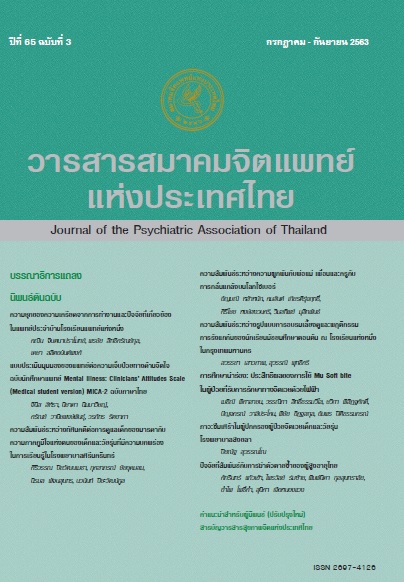Depression among parents of children and adolescents psychiatric patients at Songkhla hospital
Main Article Content
Abstract
ABSTRACT
Objective : To determine the prevalence and associated factors of depression among parents of children and adolescents psychiatric patients at Songkhla hospital.
Method : A cross-sectional descriptive study was conducted in 136 patients with psychopathology aged 2-18 years old and their parents who attended child and adolescent psychiatry outpatient clinic at Songkhla hospital during 15 February-15 March 2020. Demographic of parents and their children together with illness history were collected. Thai version of Patient Health Questionnaire (PHQ-9) was used to assess the prevalence of depression in parents.
Result : 24 of 136 parents (17.6%) of children and adolescents psychiatric patients had depression. Most of the parents were female (N=131, 96.3%) with the mean age of 40.7 years, and most of them were mother of the patients (88.2%). The mean age of the patients was 10.4 years. Logistic regression analyses indicated that the statistically significant risk factors associated with depression in parents are: intellectual disability in patients (adjusted OR = 5.54, p = 0.005), and borderline to dull normal IQ in patients (adjusted OR = 5.91, p = 0.015).
Conclusion : The prevalence of depression among parents of children and adolescents psychiatric patients was 17.6%, and associated factors were intellectual disability and borderline to dull normal IQ in patients.
Keywords : depression, parents, child and adolescent psychiatric patients, associated factors
Article Details
Articles submitted for consideration must not have been previously published or accepted for publication in any other journal, and must not be under review by any other journal.
References
2. Depression [internet]. 2013 [cited 2013 November 18]. Available from: http://www.who.int/topics/depression/en/.
3. Angela P, Christiane O, Fionna K, Silke W, Claus B, Heike H, et al. Trajectories of Mental Health Problems in Children of Parents With Mental Health Problems: Results of the BELLA Study. Eur Child Adolesc Psychiatry. 2018; 27:867-876.
4. Daniel C, Michael F, Rebecca G, Kirsten J Hancock. Longitudinal Trajectories of Mental Health in Australian Children Aged 4-5 to 14-15 Years. [Internet]. [cited 2020 Jan 20]. Available from: https://doi.org/10.1371/journal.pone.0187974.
5. Wesseldijk LW, Dieleman GC, Steensel FJ, Bartels M, Hudziak JJ, Lindauer RJ, et al. Risk factors for parental psychopathology: a study in families with children or adolescents with psychopathology. Eur Child Adolesc Psychiatry. 2018; 27:1575–1584.
6. Bawalsah J. Levels of depression in parents of children with attention deficit hyperactivity disorder in Jordan. Int’l. J. Adult Non form. Educ. 2014; 2: 031-042.
7. Nandkisor KT, Brajesh KM, Chandra SS, Rashmi S. Prevalence of psychiatric morbidity among parents of children with intellectual disability. Ind Psychiatry J. 2018; 27: 197–200.
8. Lotrakul M, Sumrithe S, Saipanish R. Reliability and validity of the Thai version of the PHQ-9. BMC Psychiatry. 2008; 8: 46.
9. สถาบันวิจัยระบบสาธารณสุข. การสำรวจสุขภาพประชาชนไทยโดยการตรวจร่างกาย ครั้งที่ 5 พ.ศ. 2557 [อินเทอร์เน็ต]. 2560 [เข้าถึงเมื่อ 19 พฤษภาคม 2563]. เข้าถึงได้จาก: https://www.hsri.or.th/researcher/research/new-release/detail/7711.
10. Supap C. Prevalence of depression and social support in mothers of children with autism aged 3 -10 years at outpatient department, Rajanukul Institute [dissertation]. Chulalongkorn University; 2009.


